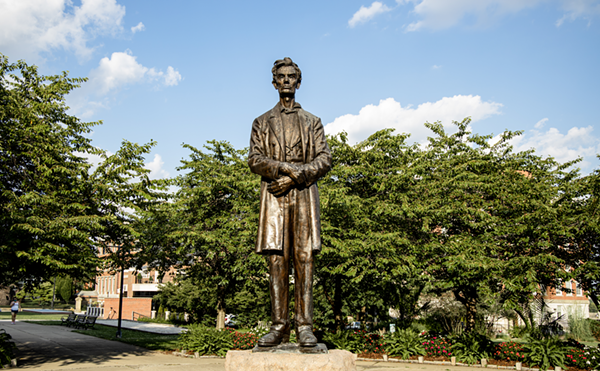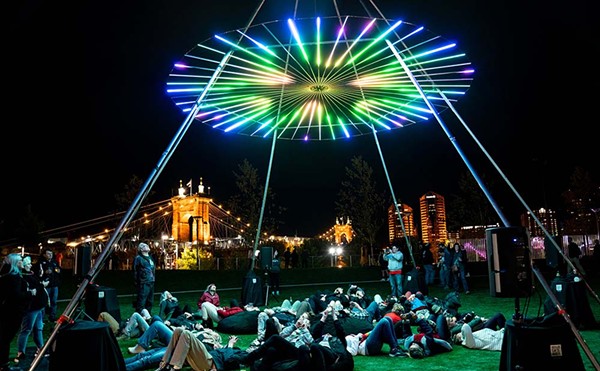|
There is an almost unfathomable sense of history surrounding the Cincinnati May Festival, the nation's longest continuous choral festival. To put it in perspective, when the festival was founded in 1873 the Civil War had been concluded for just eight years and Ulysses S. Grant was president. Napoleon had just died in exile, Renoir, Manet and Monet were creating impressionistic sensations in French galleries and Levi Strauss had just added copper rivets to his popular blue jeans. The Cincinnati Symphony Orchestra would not be officially assembled for another 22 years.
That's a lot of timeline for a unique event in the United States, and no one is more cognizant of that history than Maestro James Conlon, the May Festival's music director for the past 29 years.
"The May Festival is unique in the United States and I think it's very important that we remind our public of that," Conlon says from his New York home. "There is, in fact, no other festival like it in the U.S., devoted to an old tradition of choral singing where everything stops for two weeks and we celebrate that. The strength of that tradition is very important. We all appreciate novelty and modernity but it's important to draw from great tradition. We try to balance between works that are loved and people want to hear and things that they've never heard or things they've heard in ways they've never heard them.
Tradition is in the form and what constantly has to be new is the way the music is made and that's up to those of us on stage."
Conlon has again assembled a sterling program of longtime (and long absent) favorites and fascinating debut pieces for this year's May Festival, which runs Friday-Sunday and May 23-24 at Music Hall downtown (with this Sunday's performance at Covington's Cathedral Basilica of the Assumption). And while the festival features its usual complement of stunning vocal talent, some making their May Festival debuts, Conlon is quick to point out that the backbone of the event is the CSO and the volunteer May Festival chorus.
"All the soloists stand out, but something that's not a debut is the May Festival Chorus and the Cincinnati Symphony," Conlon says. "For me, the stars are the chorus and the symphony. That shouldn't be forgotten. Remember, they're here all the time and everyone else, we rent."
This Friday's performance might well stand as one of the festival's most exciting and anticipated (although Conlon notes that picking a favorite piece of music "is like asking which of your children do you prefer"), as Conlon conducts and Robert Porco directs the CSO and the May Festival Chorus in a full presentation of Verdi's La Forza del Destino.
"It's an epic Verdi opera that's never been performed in its entirety at the May Festival," Conlon says. "We've got a fantastic cast. (Tenor) Salvatore Licitra, who's sung this role everywhere from La Scala to the Met to Japan. Angela Brown is a marvelous soprano, and we've got the American debut of a very exciting young Italian tenor, Marco Caria. And we're having people back like Morris Robinson. It's got one of the most famous overtures in the repertory, but many people have never heard the whole opera. I'm extremely excited about that."
Saturday night's program features a festival favorite paired with a powerful debut, as Beethoven's unparalleled Ninth Symphony, a work that extols the brotherhood of man, enjoys its 20th May Festival performance after the presentation of Eric Zeisl's "Requiem Ebraico," a work written as a tribute to the composer's father who died in the Treblinka concentration camp.
"It's a Hebrew requiem based on the Psalms; the chorus sings in Hebrew and the soloists sing in English," Conlon says. "Eric Zeisl was an Austrian/Jewish composer who fled the Nazis in the '30s and came to live in Southern California, as many others did. This work was written in memory of his father but also for all the victims of the genocide. It has only been performed once or twice in the United States, and it's a beautiful work, written in the '50s. He is one of the many composers — and this is one of the many works — that have not been on the radar because they were suppressed in the '30s."
In an interesting sidebar, Zeisl's daughter, Barbara Zeisl Schonberg, and her husband, Ronald Schonberg (son of contemporary Classical icon Arnold Schonberg), will be attending this rare performance of her late father's work.
Predictably, Sunday night's performance at the transcendent Cathedral Basilica of the Assumption is, at press time, virtually sold out. Maestro Conlon will lead the May Festival Chorus in excerpts from Rachmaninoff's "Vespers," while director James Bagwell celebrates his 10th year with the May Festival Youth Chorus by presenting highlights from the past decade.
The May 23 program will feature Fauré's "Requiem," Vivaldi's "Gloria and Bach's Cantata No. 191 (Gloria in excelsis Deo)," and the festival closes next May 24 with another longtime yet sparingly presented favorite (only three previous times in the festival's history), Berlioz's Romeo et Juliette, both evenings featuring the debut of rising mezzo-soprano Isabel Leonard and tenor John Aler, performing in his 21st May Festival.
"Last year we did 'Le Infant du Christ' in collaboration with the (Cincinnati) Art Museum with projected art images and people just loved it, so we decided use the same combination: Berlioz plus a multimedia presentation of Romeo et Juliette," Conlon says. "We've organized dozens of images combined with the text of the entire piece in subtitles interspersed with the original Shakespeare. People can experience this in different layers all at once."
THE MAY FESTIVAL runs Friday-Sunday and May 23-24. Buy tickets, check out performance times and find nearby bars and restaurants here.





